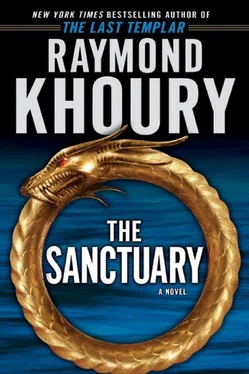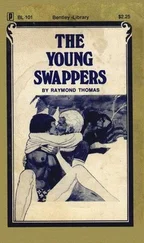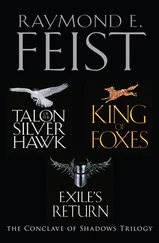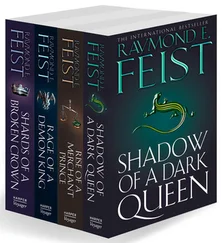They laid out the foil containers of lamb kafta skewers, hummus, and other mezes on the coffee table in the living room and sat cross-legged on cushions, digging into the food and sipping cold Almaza beers. Eating was, in Beirut as in the rest of the Mediterranean, an elaborate feast of delicately prepared dishes as well as a cardinal social ritual. Mia succumbed to the therapeutic charms of the food and the beer, and, for a while, the casual conversation between her and Corben — mostly about the meal — flowed easily, and she enjoyed the respite from the recent frenzied insanity and, she realized, his company, even though there was a guarded superficiality to what they talked about. She didn’t mind. Casual conversations, right now, were a welcome break, but as their plates emptied and the dusk’s golden light faded to black, so did the pretense of anything convivial about their ambrosial meal. The thousand-pound gorilla that had quietly been stalking them from the dark corners of its cage had clawed its way out and was now clamoring for attention.
She’d used the time alone to go over everything that had happened, everything she’d seen or heard. She felt she was missing a lot. “Jim,” she finally ventured, after a pregnant lull. “What is this really all about?”
She caught a small evasive skip in his eyes before they came back to meet hers. “What do you mean?” he asked.
“I don’t feel I’m even close to understanding what’s really going on.”
Corben’s face clouded. “I’m not sure I know much more than you do. We’ve been kind of thrown into the deep end without warning, and so far, all we’ve been doing is reacting to events as they happen.”
“But you have an idea,” she persisted. She felt her face flush. She wasn’t used to pressing someone like that, not in such a situation, but then, she’d never been in a situation like this. Not that she imagined many people had.
“What makes you say that?”
“Come on, Jim.”
“What?” he protested, spreading his hands questioningly.
“Well, the file, for one thing.”
“What file?”
She gave him a clearly dubious look. “The one you took from my mom’s flat. I had a look at it when I was in her kitchen.”
“And…?”
“And of all the stuff in her apartment, it’s the one thing you zeroed in on. There’s this symbol all over it, the snake that’s curled around in a circle, like it’s eating itself. The same symbol I saw on the cover of one of the books in the Polaroids they showed me at the police station, the ones that were in her handbag.” Mia paused, scrutinizing his face, gauging him. She couldn’t read anything in his reaction, or rather, in his lack of one, but then, she didn’t expect anything less from an intelligence operative. But she was on a roll and felt a nervous energy crackling through her. She pressed ahead. “Then there’s the gangland level of violence. I mean, Christ, I know smuggling museum pieces isn’t exactly a white-collar crime, and I’m no expert when it comes to the underworld or to what passes for normal on the streets of Beirut these days, but it all feels pretty hard-core to me — grabbing people off the street, killing others, shooting up apartments…” She trailed off, summoning up the courage to venture even further. “Then there’s your involvement.”
Corben’s brow furrowed. “My involvement?”
Mia gave him a sly but nervous half-smile. “I didn’t think the CIA was really into recovering stolen loot from museums.”
“An American national’s been kidnapped,” Corben reminded her. “That’s Agency territory.” He took a final, casual sip from his bottle and put it down coolly, before his eyes settled on her again.
As inscrutable as the Sphinx, she thought, her mind sidetracking, thinking about how maddening it would be to face him across a poker table or, worse, to live with someone as sealed in. “If you say so, but…” She shrugged and didn’t sound convinced, not that she was trying to. “Come on, Jim.” She searched his eyes for a connection, a will to open up. “She’s my mom. I know you guys have this whole ‘need to know’ thing going on, and I get that, but my mother’s life and maybe mine are in the balance here.”
She held his gaze as he clearly weighed whether to give in. She could almost hear his brain whirring, going through the worrying details of what they were involved in, and selecting what, if anything, to share and what to keep in the vault. After a brief silence, he pursed his lips and nodded almost imperceptibly, then got up and walked across the room. He brought back his briefcase and sat down again. He opened the combination lock and pulled out the file, and set it down squarely on the coffee table in front of him, resting his hands on it.
“I don’t have a full picture of what’s going on, alright? But I’ll tell you what I know.” He patted the file. “Your mom had this out on her desk, an old file which at face value doesn’t seem related to her current work. It’s on her desk the same day she meets with someone from an old dig in Iraq. I think he might have given her the Polaroids that were in her handbag. Maybe he came to see her about selling them, maybe he hoped she could hook him up with some buyers. Maybe she was interested in them herself. Because of this.” He opened the file and pulled out a photocopy, one of the images of the Ouroboros, and slid it over to Mia. “As you rightly noted, the excavation in the file has to do with this snake symbol, the same one that’s on the book.”
It was an old, black-and-white image of the coiled snake, taken from a centuries-old woodcut. Mia studied it more closely than she had before.The beast in the image was more than a snake. It had exaggerated scales and fangs, more akin to a dragon. Its eyes were cold and stared blankly ahead, as if the act of devouring itself were the most natural, and painless, of acts. It was a sinister image that harked back to a primal fear, a yellowed, weathered copy that reeked of malice.
She looked up at Corben. “What is it?”
“It’s called an Ouroboros. It’s very old, it’s been used at different times by different cultures.”
“What does it mean?”
“It doesn’t seem to have one specific meaning. I think it’s more of an archetypal, mystical symbol that meant different things to different people, depending on where it was used. I found many instances of it, from ancient Egyptian myths to Hindu legends, and later with alchemists and gnostics, and that was without spending too much time on it.”
Mia was finding it hard to draw her eyes away from the image. “The relics aren’t important. Whoever’s got her is after that book.”
“Possibly. This might tell us more.” He tapped a finger on Evelyn’s file. “I haven’t yet had time to go through it properly. Either way, it’s not really the issue. It’s only relevant in that it’s why she was kidnapped. And right now, the best lead we have for finding her is the guy who I think brought these to her, this man from her past, the Iraqi fixer you said she mentioned. He knows more about what’s going on and about who else is involved in this. We don’t know anything about him, but…” Corben paused, hesitating. Mia could see that something in him didn’t want to continue, but, after a brief moment, he said, “You could well be right in that he was the same guy who was with her when she was kidnapped. And if he was, well, you saw him. You can identify him. And I’m hoping that if he’s the same guy, then maybe”—he turned the file so it was now facing her the right way—“just maybe, there’s a picture of him in here somewhere. And that would help us a lot.”
She looked at him uncertainly, feeling somewhat shortchanged by his answer, then nodded and opened up the file again. Much as she felt drawn to the materials in it — the sheets of notes, handwritten in ink with a graceful, classic penmanship that she knew well from the letters her mom had sent her when she was growing up; the photocopies of documents and pages of books, in English, Arabic, a few in French, with sentences underlined and notes scribbled in the margins; the maps of Iraq and of the broader Levant, with markings and arrows and circled notes; all of it with many, many question marks — she flicked through them after no more than a cursory glance, looking for the photographs she needed to examine.
Читать дальше












